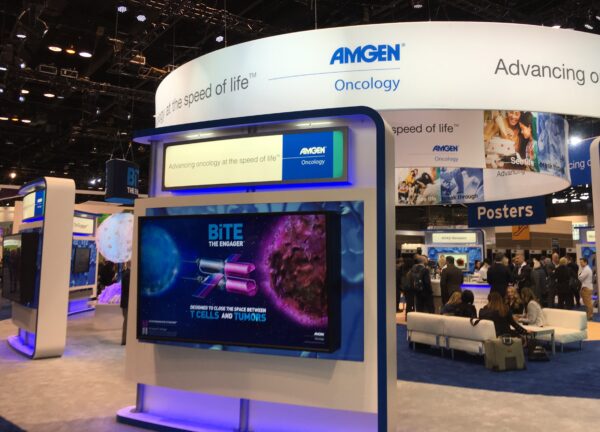
A drug that targets a protein long considered “undruggable” has racked up responses in patients with two additional cancer types, following initial response data in lung cancer presented at a conference last month.
Thousand Oaks, California-based Amgen said in its second quarter earnings Tuesday that the drug, AMG 510, had produced tumor responses in patients with colorectal and appendiceal cancer. Prior data from the ongoing Phase I/II study, which Amgen presented at the American Society of Clinical Oncology meeting last month, had shown responses in patients with non-small cell lung cancer and stable disease – but not objective tumor responses – in four patients with colorectal cancer.
In a note to investors, Cowen analyst Yaron Werber called the new data “encouraging.” The fact that the drug is now also showing initial responses in [gastrointestinal] tumors in a handful of initial patients addresses one of the lingering concerns about the data at ASCO where there were no responses in GI at that time as patients were on lower doses,” he wrote.
The patients with colorectal cancer and appendiceal cancer had been receiving the 960mg dose of the drug.
AMG 510 targets KRAS G12C and is the first drug to show activity in KRAS mutations, which are commonly expressed in many cancers but have long eluded drug treatment. KRAS G12C is the most common KRAS mutation and is estimated to occur in 13 percent of lung cancers and 1-3 percent of other solid tumors. However, while RAS proteins in general have been seen as undruggable do not have “pockets” that drugs can effectively bind to, an expert said in May that KRAS G12C in particular has a configuration that makes it more readily druggable than other KRAS mutations.
Several other companies are also developing KRAS inhibitors. Most recently, earlier this month, Redwood City, California-based Revolution Medicines said it had closed a $100 million Series C funding round that it would put toward pipeline programs that include drugs targeting RAS mutations, including KRAS G12C. And last month, Frontier Medicines launched with a $67 million Series A round, which it also plans to use to develop drugs that have “undruggable” targets.

A Deep-dive Into Specialty Pharma
A specialty drug is a class of prescription medications used to treat complex, chronic or rare medical conditions. Although this classification was originally intended to define the treatment of rare, also termed “orphan” diseases, affecting fewer than 200,000 people in the US, more recently, specialty drugs have emerged as the cornerstone of treatment for chronic and complex diseases such as cancer, autoimmune conditions, diabetes, hepatitis C, and HIV/AIDS.
But by far, AMG 510 remains ahead of the pack.
In a conference call with investment analysts Tuesday, Amgen Executive Vice President for Research and Development David Reese said that enrollment in the Phase I/II trial’s monotherapy expansion cohort had completed. The trial is now enrolling patients with NSCLC in an arm that combines AMG 510 with a PD-1 inhibitor.
Reese added during the call that in the coming days, the company plans to start enrolling patients in the Phase II portion of the Phase I/II study, which could potentially be used for Food and Drug Administration approval.
Photo: Alaric DeArment, MedCity News












